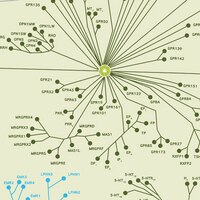Vasopressin V2 receptor antagonists.
Verbalis, J G
J. Mol. Endocrinol., 29: 1-9 (2002)
2002
Zobrazit abstrakt
Hyponatremia, whether due to the syndrome of inappropriate antidiuretic hormone secretion (SIADH) or disorders of water retention such as congestive heart failure and cirrhosis, is a very common problem encountered in the care of medical patients. To date, available treatment modalities for disorders of excess arginine vasopressin (AVP) secretion or action have been limited and suboptimal. The recent discovery and development of nonpeptide AVP V(2) receptor antagonists represents a promising new treatment option to directly antagonize the effects of elevated plasma AVP concentrations at the level of the renal collecting ducts. By decreasing the water permeability of renal collecting tubules, excretion of retained water is promoted, thereby normalizing or improving hypo-osmolar hyponatremia. In this review, SIADH and other water retaining disorders are briefly discussed, after which the published preclinical and clinical studies of several nonpeptide AVP V(2) receptor antagonists are summarized. The likely therapeutic indications and potential complications of these compounds are also described. | 12200224
 |
The V2 vasopressin receptor mutations and fluid homeostasis.
Birnbaumer, M
Cardiovasc. Res., 51: 409-15 (2001)
2001
Zobrazit abstrakt
Although three different G-protein coupled receptors have been identified for arginine vasopressin, a significant physiological role has been recognized only for the V2 subtype that controls water homeostasis. Identification of the gene encoding the V2 vasopressin (or antidiuretic hormone) receptor enabled researchers to test the hypothesis that mutations of this gene were responsible for X-linked recessive nephrogenic diabetes insipidus. The affected patients are unable to concentrate their urine and as a consequence live in constant danger of dehydration that can cause death, particularly in infancy, or lead to severe hypernatremia that can impair their intellectual and physical development. The danger of severe dehydration diminishes in the adult patients, although they remain highly susceptible to this condition for the rest of their lives. | 11476731
 |
Vasopressin receptors.
Birnbaumer, M
Trends Endocrinol. Metab., 11: 406-10 (2000)
1999
Zobrazit abstrakt
The biological effects of arginine vasopressin (AVP) are mediated by three receptor subtypes: the V1a and V1b receptors that activate phospholipases via Gq/11, and the V2 receptor that activates adenylyl cyclase by interacting with Gs. Isolation of the cDNAs encoding the V1a and V1b receptor subtypes explained the tissue variability of V1 antagonist binding, whereas identification of the cDNA and gene encoding the V2 receptor provided the information to identify the mutations responsible for X-linked nephrogenic diabetes insipidus. Mutations that abrogate the production and/or release of AVP from the pituitary have diabetes insipidus as their most dramatic manifestation, indicating that the maintenance of water homeostasis is the most important physiological role of this neuropeptide. Evidence for a significant role of AVP in blood pressure control, although actively sought, has been scant. | 11091117
 |
















